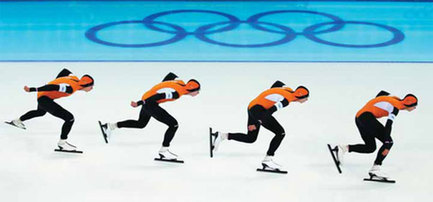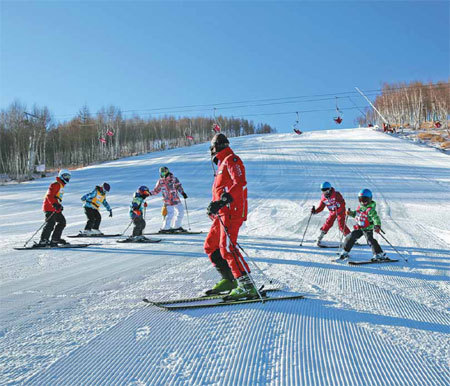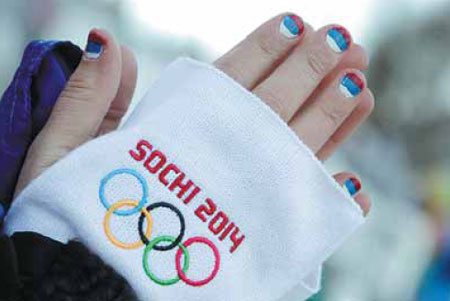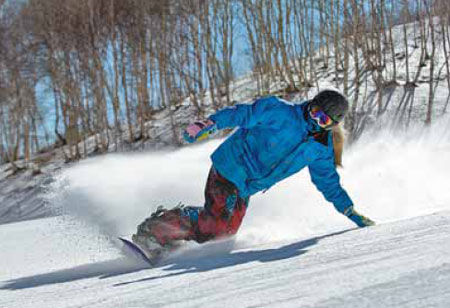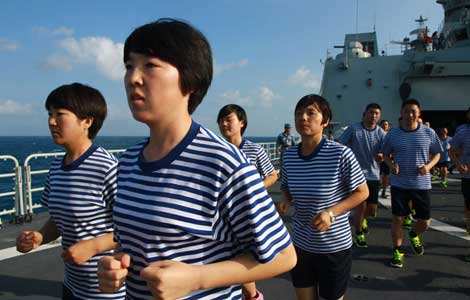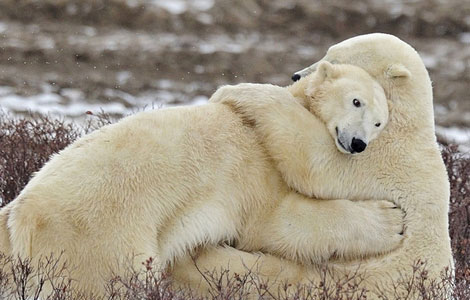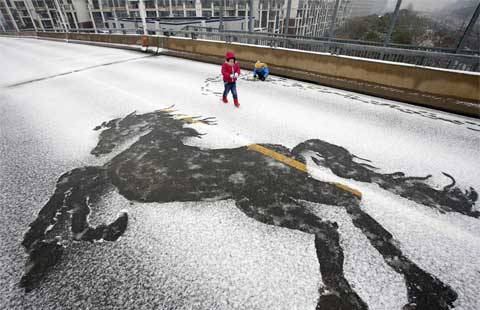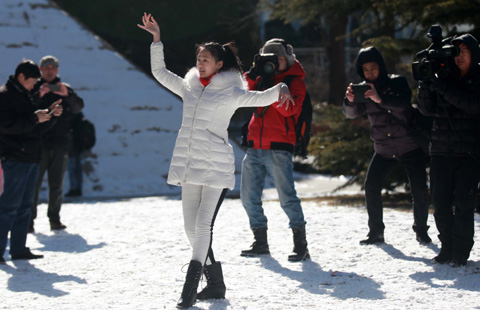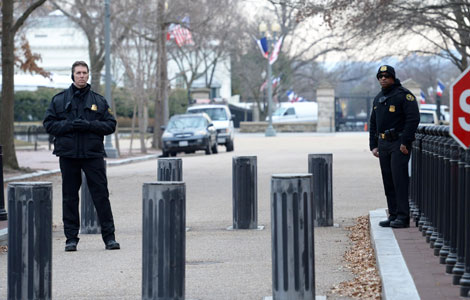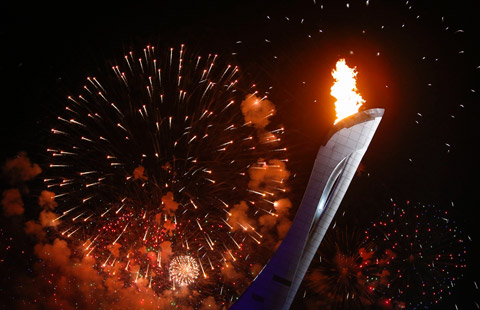Games bid to boost winter sports
Updated: 2014-02-10 08:02
By Cui Jia in Urumqi, Xinjiang, and Lei Lei in Sochi, Russia (China Daily USA)
|
||||||||
Nation has been active developing facilities for sporting events, report Cui Jia in Urumqi, Xinjiang, and Lei Lei in Sochi, Russia
It is not the winning but the taking part that counts.
The sentiment behind the Olympic ethos can apply just as much for the bidding to host the Games as it does for the actual events, it seems.
When Cheng Hai learned that Beijing and Zhangjiakou will jointly bid for the 2022 Winter Olympic Games, the avid ski enthusiast knew that he might soon have world-class ski resorts on his doorstep.
Cheng discovered the joy of winter sports when he started to work some years ago at a snowboard company.
"I sometimes went abroad to ski during vacations, but that was expensive," said Cheng, 34. "I hope the bid will bring more advanced venues and attract greater numbers of people to join us skiing."
Millions of ski fans in China share Cheng's outlook.
Regardless of the success of the bid, to be decided in 2015, the bidding process will benefit the development of winter sports in China.
"Bidding for the Winter Games will boost the popularity of winter sports," Xiao Tian, deputy head of the State General Administration of Sport, told China Daily at the Sochi Games.
"China is a huge country but the development of winter sports still lags behind the summer sports. But the potential and sense of expectation to develop winter sports here is massive."
Beijing, the host of the 2008 Summer Olympic Games, announced a plan to jointly bid for the 2022 Winter Olympic Games in November, with Zhangjiakou, Hebei province, located 200 km to the northwest of the capital.
Under a plan Beijing bidding committee officials announced on Saturday in Sochi, the MasterCard Center in Beijing will host five winter events as one of the main locations. The center held basketball competitions during the 2008 Games. The opening and closing ceremonies will be held in the National Stadium, often referred to as the Bird's Nest.
The second major venue, according to the bid, will be located in the Xiaohaituo Mountain area of Yanqing county, about 90 km northwest of central Beijing. Temporary venues will be built for the bobsled, luge, skeleton and alpine skiing events.
The rest of the ski sports will be held in Chongli county, Zhangjiakou, which is about 220 km from central Beijing and 130 km from Xiaohaituo Mountain.
Besides the proposed venues, how China actually performs in the Winter Olympics will be an important factor for members of International Olympic Committee to consider, as the Games are traditionally held in the event's powerhouses.
China has had an enviable record in the Summer Games and topped the gold medal tally in 2008 where it claimed 51 gold medals, 21 silvers and 28 bronzes. It came second in London in 2012.
But in winter sports, the traditional powerhouses are Canada, the United States, Germany and Norway. China achieved its best result four years ago in the Vancouver Games in Canada, where it claimed five golds, two silvers and four bronzes, ranking seventh in the medal tally.
Experts recognize the potential for winter sports to develop in the country.
"The bid will bring more professional ice skating facilities and ski resorts to the Chinese people, encouraging them to attend and participate in various winter events," said Wei Jizhong, the honorary life president of Federation International de Volleyball and former secretary-general of the Chinese Olympic Committee.
"China has made major breakthroughs in winter sports recently, but the whole level still needs to be improved," he added.
China's first Winter Olympics gold medallist Yang Yang agreed.
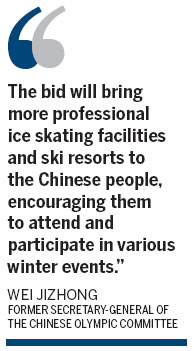
"Whether we win or lose, it's a good opportunity for China to develop its winter sports," said Yang, who is now an IOC member.
Yang's victory in the women's 500m short track speed skating at the 2002 Salt Lake City Games brought China its first ever Winter Olympics gold medal.
From that moment on, China has seen marked progress in winter sports, especially in speed and figure skating and women's curling.
However, due to climatic conditions, winter sports are mainly strong in three northeastern provinces - Heilongjiang, Jilin and Liaoning.
To better facilitate the bidding, China has rapidly developed winter sports facilities in other areas, such as in the Xinjiang Uygur autonomous region and the Inner Mongolia autonomous region in the north and Shanghai and Jiangsu province in the south.
Since Xinjiang was chosen four years ago to host the National Winter Games in 2016, authorities in the region have attached great importance to the development of winter sports, which were once neglected, said Azat Turson, director of Xinjiang Sports Bureau
Xinjiang's climate is perfect for winter sports and more than 200 ski resorts have been built in the region.
China's freestyle skiing team trained in Xinjiang before heading to Sochi and Azat hopes the region will provide more top quality training facilities and opportunities for national, as well as regional teams, in the future.
"To attract top athletes, ski resorts need to plan ahead. The presence of world-famous athletes is extremely important because they inspire young people," he said.
But the development of winter sports facilities in the region is still behind Jilin and Heilongjiang provinces.
"Part of the problems for ice events will be solved after a world-class training center funded by the government is put into use in Urumqi, capital of the region, at the end of 2014," said Wang Yimin, director of Xinjiang winter sports administrative center.
"Hosting the 2016 National Winter Games and China's bid for the 2022 Winter Olympics have created great opportunities for Xinjiang to promote winter sports," he added.
Currently, Xinjiang has only 65 professional winter sports athletes training in six ice and snow events out of a population of the region of more than 22 million, Wang said.
"But the input has already shown results as one Xinjiang athlete has qualified to compete in the World Junior Speed Skating Championships taking place in Norway in March this year," he said.
The Inner Mongolia autonomous region has also developed its winter sports facilities in recent years.
"We have re-established our winter sports teams. At the 2012 National Winter Games, we won one gold, two silver and three bronzes, the best results we have ever achieved in winter sports," said Shi Mei, chief of Inner Mongolia sports bureau.
"The bidding for the Winter Games offers us a golden opportunity to further develop winter sports and I hope our local athletes win medals in the next Winter Olympics in 2018," Shi added.
Apart from medal tallies, senior officials have bigger ambitions.
"If Beijing and Zhangjiakou successfully win the bid, it will attract people in these areas, even in neighboring Shanxi and Shandong provinces to take part in winter sports, which means hundreds of millions more people will know more about winter sports," said Yang Shu'an, vice-president of Beijing 2022 Olympic Winter Games Bid Committee and vice-president of the Chinese Olympic Committee.
"Undoubtedly, it will be a big contribution to the Olympic Movement," he added.
Contact the writers at cuijia@chinadaily.com.cn, leilei@chinadaily.com.cn
|
Athletes compete in the men's 5000m speedskating event during the Sochi 2014 Winter Olympics on Saturday. More Chinese have started to enjoy winter sports after the country announced its bid in November to hold the 2022 Winter Olympic Games. Brian Snyder / Reuters |
|
Children learn technique at a winter camp in Chongli county, Hebei province. The camp is enjoying increasing popularity. Mou Yu / Xinhua |
|
A spectator shows her allegiance down to her fingernails at the Winter Olympics on Saturday. Jae C. Hong / AP Photo |
|
A snowboarder tackles the slopes at Yunding ski resort in Chongli. Wei Xiaohao / for China Daily |
(China Daily USA 02/10/2014 page7)
Most Viewed
Editor's Picks

|

|

|
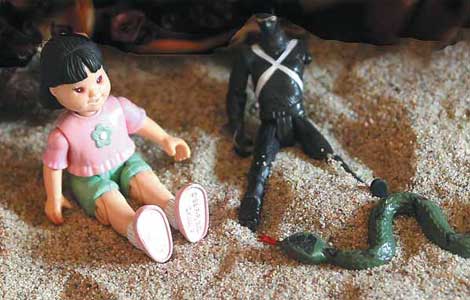
|

|

|
Today's Top News
Retirement age should be raised to 65: experts
Kerry to reaffirm positive US-China ties
ICBC beings operating in Peru
Visit keeps momentum going
Masuzoe wins Tokyo governor election
Shanghai tops Asia on fashion
Nanjing Massacre is undeniable
Lessons of history for Japan
US Weekly

|

|
